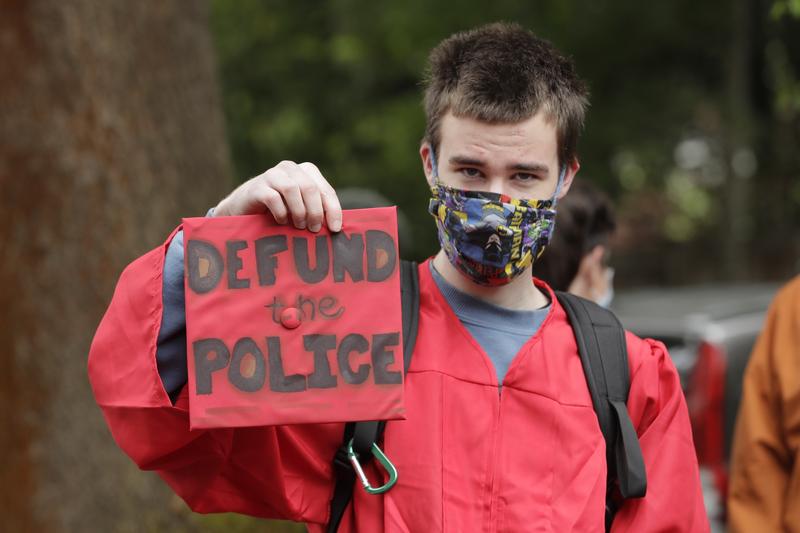 Elliot Armitage, a 2020 graduate of Ballard High School, holds his mortarboard cap that reads "Defund the Police" as he prepares to take part in a cap and gown Black Lives Matter march with other high school graduates, Monday, June 15, 2020, in Seattle. (TED S. WARREN / AP)
Elliot Armitage, a 2020 graduate of Ballard High School, holds his mortarboard cap that reads "Defund the Police" as he prepares to take part in a cap and gown Black Lives Matter march with other high school graduates, Monday, June 15, 2020, in Seattle. (TED S. WARREN / AP)
Amid the protests over the death of George Floyd, states and cities across the United States are looking to reallocate funds from their police departments into social programs to help communities of color and other marginalized groups, while also changing police tactics that could be deadly.
In recent days, protesters and activists in many cities have embraced the slogan "Defund the Police"
Initially, the demonstrations that have swept across the country have focused largely on what happened to Floyd-a black man who died on May 25 after a white police officer pressed his knee on his neck for nearly nine minutes as he pleaded for mercy and said he couldn't breathe before losing consciousness-as well as the history of police abuse against black people.
In recent days, protesters and activists in many cities have embraced the slogan "Defund the Police".
They say they have given up on trying to change police behavior and are instead advancing a more radical idea: Cutting their budgets and giving police functions to other municipal departments or community groups.
In Minneapolis, a veto-proof majority of the city council pledged on Friday to dismantle its police department and create a new system of public safety.
Mayor Jacob Frey expressed support for major structural reform of the police department, but reaffirmed his opposition to disbanding the police.
"We need a full structural revamp. But abolishing the police department? No, I think that's a bad idea," he told National Public Radio.
While some seek to abolish police departments, others favor cutting budgets and transferring the saved money to social programs and other reforms.
From 1977 to 2017, state and local governments' spending on police increased from US$42 billion to US$115 billion, according to Urban Institute data.
Many cities have acted quickly on that direction, with moves to divest funding from police pledged or underway in Los Angeles, New York, Seattle, San Francisco, Baltimore, Philadelphia, Chicago and at least a dozen other US cities.
Patrisse Cullors, a co-founder of the "Black Lives Matter" movement, said she eventually wants to see police forces abolished entirely.
Reallocating funds
Meanwhile, she said she would like to see at least some funding shifted from police departments toward organizations that support marginalized communities. "It's not just about taking away money from the police, it's about reinvesting those dollars into black communities."
ALSO READ: Floyd ‘changed world’, family told
In Los Angeles, Mayor Eric Garcetti, a Democrat, said he would use US$250 million from his proposed city budget for youth jobs, health initiatives and trauma healing centers-including up to US$150 million from the police budget of US$1.86 billion.
In New York City, which has the country's largest police force, Mayor Bill de Blasio, a Democrat, said he would move funding from the department's US$6 billion budget to youth initiatives and social services. He didn't say how much would be taken from the agency.
On Friday, the mayor rejected a proposal by the City Council for US$1 billion in cuts, while indicating that he was open to further negotiations over the size of the police department.
While moving to shrink police budgets and reallocate the money, lawmakers and police departments themselves in several cities also have approved new laws or policies for apprehending suspects to reduce the risk of deadly encounters.
They range from barring the use of chokeholds in Los Angeles and New York, to prohibiting police in Austin, Texas, from shooting at fleeing suspects unless they pose an imminent threat.
In Washington, where authorities used tear gas and rubber bullets to clear peaceful protesters from Lafayette Park for US President Donald Trump to stage a photo opportunity at St. John's Church, the District of Columbia's Council passed a series of changes last week. These include prohibiting the use of chemical irritants, riot gear and stun grenades on demonstrators exercising their First Amendment rights.
In New York, Governor Andrew Cuomo on Friday signed a package of bills designed to overhaul several aspects of policing.
In addition to banning the use of chokeholds, they repeal a half-century-old law in the state that has kept police disciplinary records secret.
READ MORE: Calls ring out for change at Floyd funeral
Cuomo also ordered all local governments across the state to reform their police forces by April 1, 2021, or face a cutoff in state funding.
Last week, a campaign spokesman for Joe Biden, the presumptive Democratic presidential nominee, said the former US vice-president "does not believe that police should be defunded".
Meanwhile, Trump, who has sought to tie his November opponent to the defunding push, tweeted last week: "We won't be defunding our police. We won't be dismantling our police."


